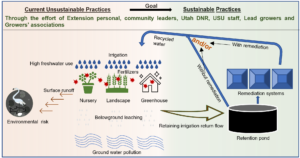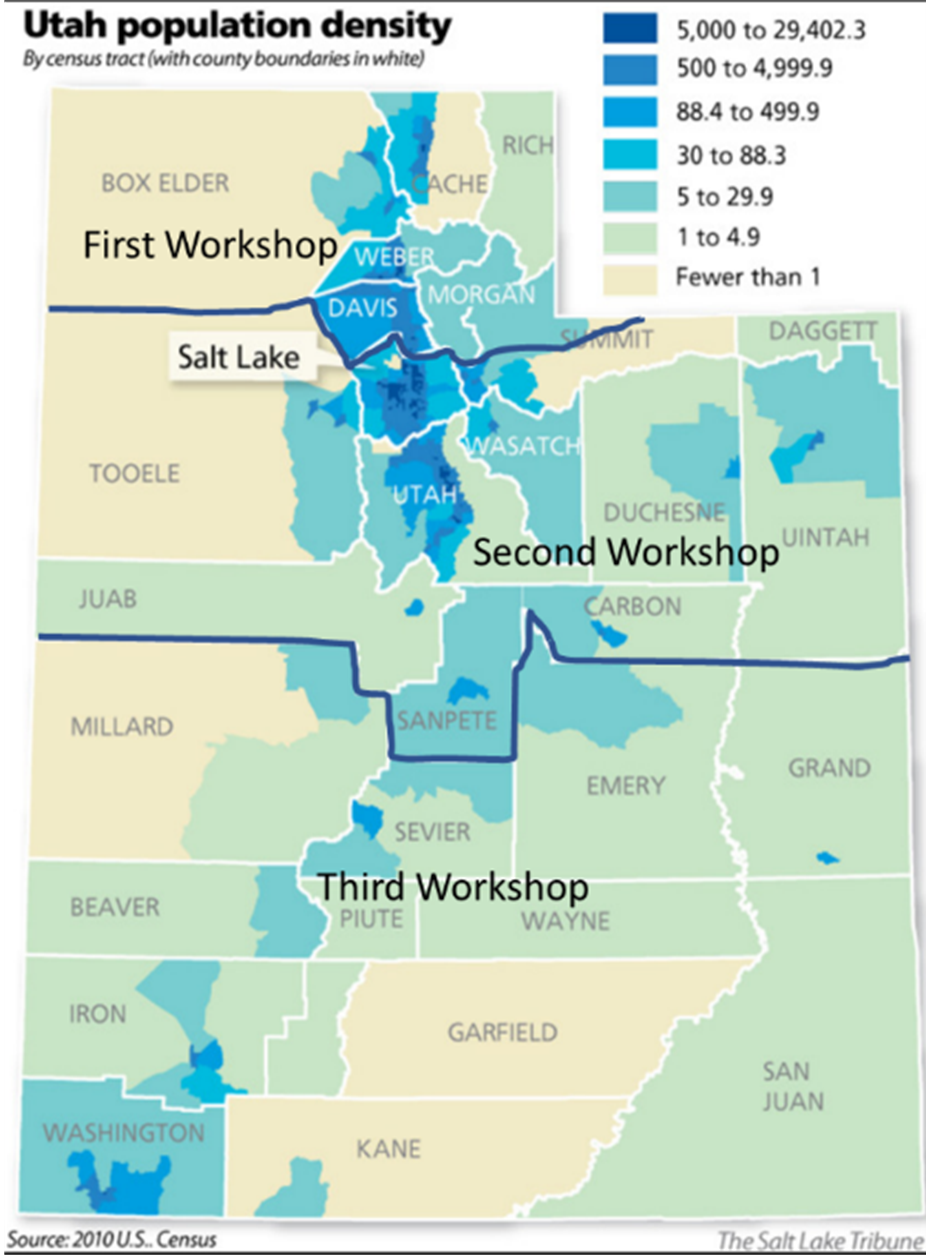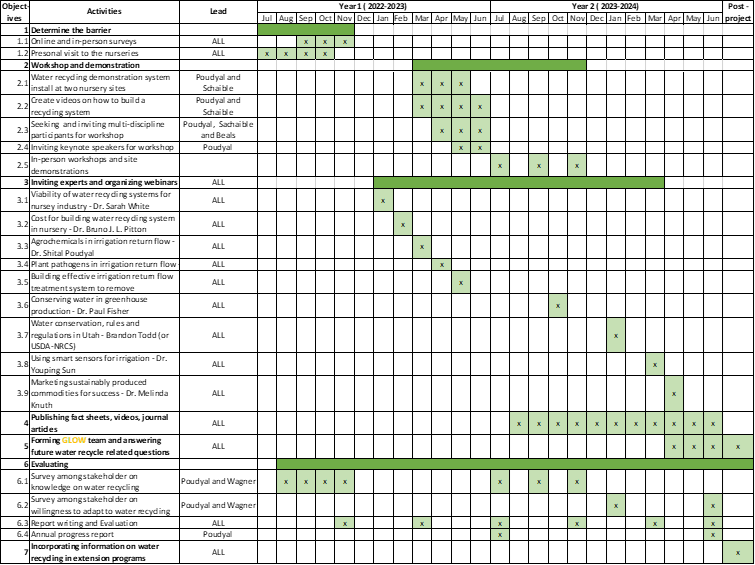Progress report for WPDP22-014
Project Information
Lesser precipitation, increasing population and extreme drought is already impacting the nursery and landscape industry in Utah. Current uncertainties in water availability and strict water regulations demand nursery and landscape growers to look for alternative irrigation approaches. Capturing and reusing irrigation return flow as an alternative source of irrigation is common in many parts of the United States but is very unusual in Utah. Recycling irrigation return flow can increase the sustainability of the nursery and landscape industry in two major ways 1) reduce the amount of fresh water used for irrigation and 2) lower irrigation runoff to watershed areas hence reducing non-point source (agrochemical) pollution. There are numerous resources to incorporate a water recycling approach in nurseries, which were developed as an outcome of several research projects outside Utah. Those resources can be modified, customized, and outreached to Utah's landscape and nursery industry to incorporate a water recycling approach in Utah’s nursery and landscape industry. Through this project, we will train and educate state outreach personal from Utah State University Extension, Utah Department of Natural Resources (Utah- DNR), United States Department of Agriculture - Natural Resources Conservation Service (USDA-NRCS) and nursery and landscape growers on incorporating a water recycling approach in the landscape and nursery industry. In turn, those trainees will then go to their respective jurisdiction/territory to outreach their knowledge to persuade and promote water recycling approach in the nursery and landscape industry. It is highly likely that in near future, Utah will have harsher water regulations. If the footsteps of California and Arizona are followed, water recycling will be mandated in the nursery and landscape industry. Therefore, this project will also create and archive resources on water recycling and form a team of specialists to tackle water recycling questions and problems in Utah.
Figure 1
Detailed Objectives:
- Determine the barrier to adoption for retaining and recycling water in nursery and landscape industry.
- Educate extension personal, water professionals and lead growers on the importance of implementing water recycling systems in the nursery and landscape industry.
- Educate and train professionals in the nursery and landscape industry on implement successful water recycling systems.
- Empower agricultural and water professionals to disseminate information in communities across Utah.
- Establish a team of experts to tackle water recycling questions.
We will accomplish our objectives by conducing the following actions:
- Determining the barrier to adoption for retaining and recycling water in nursery and landscape industry through in-person and virtual meetings with landscape and nursery professionals, growers, county extension personals and home gardeners.
- Conducting participatory workshop, field demonstration and round table discussion of water recycling systems in a real nursery environment along with producing videos and instruction materials on how to integrate runoff recycling system in a nursery.
- Conducting webinars (10 in total) by inviting researchers and extension personals expert in their field on how to adopt water recycling and archiving complete information in a free and easily accessible online portal. The topics of webinars with expected speaker is provide in the timeline chart under method and timeline section.
- Developing fact sheets, short videos and journal articles on water recycling for ornamental crop production.
- Creating a GLOW (Growing Landscape plants and Ornamentals Wisely) team that will address the needs of Utahns and beyond on questions and concerns related to water recycling.
- Evaluating the willingness of stakeholders to adopt to water recycling before and after the project.
Our proposed grant is for two years with first and second year for project implementation and second year for project evaluation. Our investigators in Northern, Mid and Southern parts of Utah will first conduct an online or in-person survey using a pre-prepared questionnaire including both subjective and objective questions to understand nursery and landscape growers’ perceptions on recycling irrigation water, consequences of uncontrolled runoff and the barriers to the adoption of water recycling for irrigation. These surveys will help to determine the level of understanding and knowledge that the stakeholder has and will be used to modify or customize the program agenda to address actual needs of stakeholders. Surveys will be done at different locations by each investigator at various extension programs. We will then conduct three different hybrid-type demonstration/presentation/participation workshops. Each workshop will include participants from surrounding counties as listed in figure 2. Each workshop will be a two-day event. The first day will be an indoor participatory discussion session about how recycling water would fit to their growing practice, presentations on how water sustainability can be achieved in nursery production and finally an open-ended conversation on how materials from those presentation could benefit growers. The second day will be demonstration of pre-installed water recycling system in a nursery, explanation of how the system function and hand-on experience on troubleshooting problems in the. We anticipate around 25 participants for each workshop who will include nursery, landscape and greenhouse growers, members from nursery and landscape association, USDA-NRCS water conservationists, Utah DNR and cooperative extension personal. Globally renowned expert will be a keynote speaker for each workshop. We will have Dr. Sarah White, Dr. Damon Abdi and Dr. Jennifer Parke respectively for three different workshops.
Figure 2
Throughout the program duration we will cover all the topics related to water recycling (listed in the Ghant Chart below) in nursery and landscape industry via the webinar by the expert in respective fields.
Core team members will prepare fact sheets, online videos, journal articles and other resources during entire project cycle and will meet quarterly, to discuss progress and future ideas. By the end of this project, Dr. Poudyal, Ms. Schaible, Ms. Wagner and Mr. Zimmerman will form a perpetual core team call GLOW. They will be responsible for future correspondence with growers on topic related to water recycling even after project termination.
Gantt Chart
Cooperators
Education
We had contacted multiple subject matter specialists and asked them to present at our monthly webinar. We were successfully able to conduct eight listed webinar in the proposal. Below is the information on the conducted webinars with dates and presenters
|
Title of webinars |
Webinar dates |
Presenters |
|
Introductory meeting and concept of Irrigation Return Flow |
January 19th,2023 1:00 pm to 2:00 pm |
Dr. Shital Poudyal Utah State University |
|
Viability of water recycling systems for the nursery and landscape industry |
February 16th,2023 1:30 to 2:30 pm |
Dr. Sarah White Clemson University |
|
Cost and return on investment on construction of water recycling system in the nursery |
March 14th,2023 12:30 pm to 1:30 pm |
Dr. Robin Brumfield and Dr. Raul Cabrera Rutgers University |
|
Agrochemicals in irrigation return flow and how it affects plants |
April 20th,2023 1:30 to 2:30 pm |
Dr. Shital Poudyal Utah State University |
|
Minimize risk from plant pathogens in irrigation water |
May 18th, 2023 1:30 to 2:30 pm |
Dr. Paul Fisher University of Florida |
|
Building effective irrigation return flow treatment system to remove agrochemicals |
June 15th,2023 1:30 to 2:30 pm |
Dr. Damon Abdi Louisiana State University AgCenter |
|
Increasing irrigation efficiency in greenhouse and ornamental nursery production with moisture sensors and other technology |
November 16th,2023 2:00 to 3:00pm |
Dr. Andrew Ristvey University of Maryland |
|
Marketing sustainably produced commodities for business success |
January 18th,2023 1:30 to 2:30 pm |
Dr. Melinda Knuth North Carolina State University |
In all those webinar, we invited national subject matter experts to present on the topic. Because of the time conflict with most of our participants we got on an average 25 live participants on the webinars however we did edit, professionally captioned and uploaded those webinars in the YouTube and informed our participants. We were able to speculate that the our 75 targeted participants watched the video as the video garnered at total of 75 views (live and recorded viewers) fews weeks after upload. Below are the list of YouTube video produced with their current viewerships:
(139 views)
(93 views)
(47 views)
(63 views)
(58 views)
(74 views)
(96 views)
We are still working on few online articles and fact sheets related to to project
Demonstration site and in person workshop
We partnered with Progressive Plants nursery to built the demonstration water recycling site in their operation space. The site was up and running in the summer of 2023 with four different nursery plants taxa. We are currently conducting data analysis however the initial results reveal that there was no visual damage or growth reduction of those plants.
We also conducting a two day workshop on September 27th and 28th of 2023 where we will invited participants to the workshop to discuss different aspects of water reusing in nursery production. Sixteen participants toured the demonstration site at Progressive Plants where they saw and learned about nursery production process.
We also invited Engineer Erik Jones from Utah Department of Natural Resources, Water Rights Division where he presented on Exploring the Influence of Water Rights on Runoff Water Collection and Recycling for Utah's Nursery Growers and had an extensive interaction with our audience to answer their questions.
We had planned to build a demonstration site in southern Utah in Big Tree Nursery and use it for the workshop and demonstration however Candace Schieble who was lead that left and now we are having hard time constructing water recycling system in southern Utah. We hope to make some progress in 2024.
Education & Outreach Initiatives
We conducted multiple online and one-on-one surveys among the participants of our program. We made a distinction between growers and non-grower participants for our data collection. Below is the synopsis of our survey.
Following were the outcome sof the survey:
Lack of knowledge/training on cost and installation was the top barrier to recycle runoff water followed by the cost of installation
71 out of 73 participants who responded to the survey had no training in water recycling.
Why do you think water retaining and recycling runoff water is important in nursery and landscape industry ?(73 respondents)
Most of the respondents perceived the scarcity of freshwater for irrigation as the main reason for retaining and recycling runoff water. The second next reason was to lower water bills.
22.5 % was the average confidence level of participants to install or provide guidance on installing water recycling system
Out of 50 growers or growers-related respondents, only 7 growers recycled water and the reason for not recycling was the lack of expertise.
Almost 2/3rd of growers were willing to implement water recycling.
We conducted our eight webinars, one two day workshop, one in person presentation and a tour of and operational irrigation return flow recycling system and described the rationale for implementing water recycling systems in the nursery and landscape industry. We will conduct a survey towards the end of the project to find how how the understanding of recycling irrigation return flow have changed.
Our participant are learning all the aspects of recycling irrigation return flow through in person and online resources and toward the end of the project we will teach them about effective way to outreach those resources.
We will complete this objective toward the end of project cycle through in person communication and survey.


